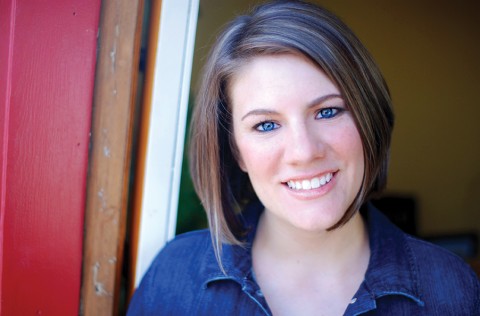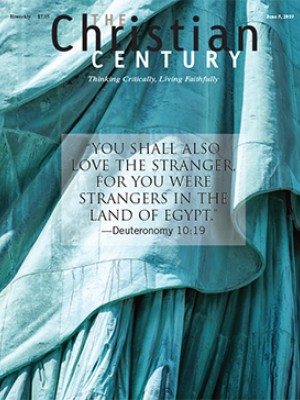The doors that Rachel Held Evans wedged open
She pointed toward a God who loves us in ways we can’t yet comprehend.

By writing and speaking about her own religious struggles in a way that was both irreverent and profound, Rachel Held Evans invited a host of doubters and rebels into a fresh conversation about Christian faith. This apostle to outsiders, who died on May 4 at age 37, was authentic, candid, smart, and funny, refreshingly unintimidated by church hierarchies, particularly ones that exalted only men.
In her blog posts and books, Held Evans took on the shibboleths of the conservative evangelical faith of her childhood. For many people—especially women—who were struggling to find their way out of an evangelical milieu, Held Evans offered a safe haven. Many of them took to social media after her death to share their stories, tagging them #becauseofRHE.
Read our latest issue or browse back issues.
Nadia Bolz-Weber, a Lutheran pastor and writer who founded the Why Christian conference with Evans in 2015, told the New Yorker, “Rachel pried open the door and then put her foot in the threshold and kept it open for other people.”
I was once one of the outsiders. A convert to Christianity decades ago, I joined the church in part because I found the gospel included all sorts of oddballs and marginal characters. In fact, Jesus seemed to welcome them with particular warmth.
But as the years rolled by, I began to realize that many churches, concerned with their own survival, are often more risk-averse than the local savings and loan, and less friendly than the neighborhood bar. I know people who walked out of the church in anger or grief—or because they never found the church relevant to their deepest questions and struggles.
The challenge for mainline churches, like the Episcopal one Held Evans made her home in recent years, is to make the vision of an inclusive Jesus-centered community a reality in the pews and at the altar. While the number of women clergy is on the rise in Protestant denominations, their presence in leadership positions is still relatively rare: though women have constituted half the students at mainline-affiliated seminaries, among mainline pastors only 27 percent are women, as documented in a report last year.
After writing the best-selling A Year of Biblical Womanhood, Held Evans began using eshet chayil, a Hebrew phrase from Proverbs 31 that can be translated “woman of valor,” to cheer on other women. Always willing to make the tent wider, Held Evans celebrated the voices of writers of color such as Austin Channing Brown, who wrote on Twitter: “I am in no way overstating that I have a career I love because Rachel didn’t just call me a woman of valor, she treated me like a woman of valor. She was generous with her platform, with her contacts, with her time and money. She was generous with her advice. She was generous.”
For many mainline congregations, Sunday morning remains the most segregated part of the week. The church (at least, the Episcopal church, to which I also belong) has still not found a way to promote minority women that is sustained and pervasive. One example: it was only in May that the second African American woman was consecrated bishop of a diocese.
Then there is the role of laypeople in denominations that often vest most of the power in people with collars and theological degrees. Held Evans, who was not ordained, spoke freely on that issue. “I know that there’s a lot of people who feel like, ‘Well who is she? She didn’t go to seminary, she hasn’t cut her teeth as a pastor,’” Held Evans told the Washington Post in 2015, the year she published Searching for Sunday: Loving, Leaving and Finding the Church. “I think some people feel like it’s a little bit of a threat to authority, that somebody can just be a blogger, and people will listen to what they say.” How many laypeople, including those who worship in mainline pews, feel confident enough to take on their clergy?
Held Evans wrote, in Searching for Sunday: “Imagine if every church became a place where everyone is safe, but no one is comfortable. Imagine if every church became a place where we told one another the truth. We might just create sanctuary.”
At a time in American Christian culture when many are seeking safe harbor outside the institution, the best-selling author didn’t want to be canonized: like other prophets, she pointed the way to a God who loves us in ways that we can’t yet comprehend. Held Evans tried to use her fame to help people find renewed hope and new life in sacred places, concrete and virtual, where they had once felt rejection and despair.
A tribute by Emma Green in the Atlantic quotes Held Evans affirming essentials of Christian faith: “Death is a thing empires worry about, not a thing resurrection people worry about. As long as there’s somebody baptizing sinners, breaking the bread, drinking the wine; as long as there’s people confessing their sins, healing, walking with one another through suffering, then the Church is alive, and it’s well.”
Christianity in America is more lively, loving, generous, and honest because of Rachel Held Evans. Now it’s up to the rest of us to make sure that door remains wedged open.
A version of this article, which was edited May 17, appears in the print edition under the title “Apostle to outsiders.” The author is not related to Rachel Held Evans.






